Katherine Harvey: ‘The way modern popular culture imagines medieval sexuality is quite inaccurate’
In ‘The Fires of Lust: Sex in the Middle Ages’, the British scholar debunks myths and offers surprising facts about medieval carnal relations
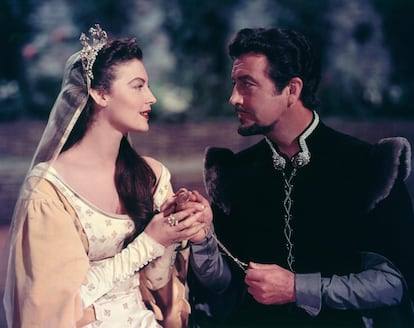

The Fires of Lust: Sex in the Middle Ages is an exciting history by British author Katherine Harvey, a PhD in history from King’s College London, researcher, professor, author of numerous articles in academic journals and editor of Notches, a blog on the history of sexuality. In her book, Harvey offers a view of medieval sexuality that debunks myths (such as that sex in the Middle Ages was dirty, violent and depraved) and provides interesting information in a rigorous yet entertaining way, displaying a remarkable sense of humor that also shines through in her interview with EL PAÍS. She is currently working on a book about healthy habits in the Middle Ages.
Question. You explain in your book that oral sex was very uncommon in the Middle Ages.
Answer. It is difficult to say for sure, but in any case it was a much stranger practice than it is today. In general, all sex for non-reproductive purposes was considered a sin and disapproved of. That was also the case with anal sex. On the other hand, they practiced interfemoral intercourse, in which the penis is placed between the thighs; it worked as a contraceptive method but also seemed less sinful to them.
Q. How did medieval thought affect sex in the Middle Ages?
A. Religion was a very important factor then. There was a lot of emphasis on virginity and abstinence, chastity. And there were curious debates such as whether Eve had menstruated in the Garden of Eden or Adam had wet dreams. But the truth is that the Church itself sometimes had a more positive view of sex because it prevented more serious sins and was basically necessary to bring new Christians into the world. Some of the period’s medical ideas were also conducive to sex: there was a belief that a certain amount was necessary for a healthy life and that total abstinence, like excess, could lead to death. That was often a cause of concern for the ecclesiastical authorities, given the celibacy requirement. A curious fact is that having premarital relations was very common. In any case, medieval thought was imbued with the idea that sex was not an individual thing — a means of pleasure — but a very important social factor, and that it had to be regulated by religious and secular authorities.

Q. What about masturbation?
A. It is difficult to know [for sure], but it seems to have been of relatively little concern, compared to other periods. [It was] a matter to be dealt with in the confessional or in each person’s conscience.
Q. Did the lack of precise anatomical knowledge, especially about the female anatomy, condition the sex of the time?
A. Knowledge was limited compared to ours and not very precise. The woman was considered to be an inverted and frigid man. But, for example, they understood the mechanism of menstruation reasonably well, and how it affected fertility. It was not appropriate to have sex during one’s period, partly out of prejudice but also because they knew that women did not get pregnant [during that time] and, again, that went against what the Church advocated.
Q. One must remember that at least half the population did know the female anatomy: women.
A. But [the population] didn’t believe them much. There would also be quite a lot to say about what men know today. One interesting thing is that, back then, people thought that both the man and the woman released a seed in the sexual act, but only if they felt pleasure during copulation. Therefore, only those who had enjoyed themselves became pregnant. Legally, in a rape prosecution that meant that if the woman got pregnant she had not been forced, with all of the attendant injustices. Of course, women knew that pleasure and pregnancy were not linked.
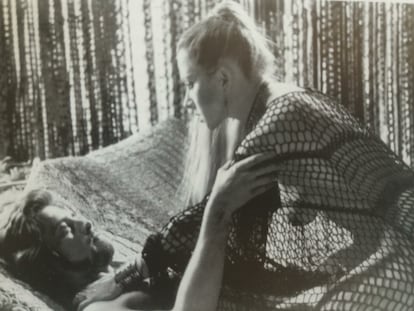
Q. What would surprise us most in a medieval bedchamber?
A. Probably the lack of intimacy, the absence of that privacy we are used to. In the Middle Ages, it was very difficult to have any [privacy], and there was very little of it, it was a luxury. Entire families lived in one room, many couples shared a bed with their children, and the houses were so flimsy that neighbors could peek through the cracks in the walls. Unlike what you see in the movies, making love without anyone seeing you was difficult. That’s proven by the fact that in the many adultery cases we know of, there are always witnesses in court who say they saw the couple having sex.
Q. Did the belief in witches, magic, the devil, incubi and succubi affect sex?
A. It was a factor, of course. In the late Middle Ages, we have many cases of women being accused of having sex with the devil, and of being witches. There were a lot of magic spells and potions to induce people to fall in love. And that was of great concern to society, where the notion of consent was more developed than we usually think. People in the Middle Ages were not comfortable [with the idea] that those things could happen, that someone could take you against your will.
Q. Wow, like slipping a roofie into a drink at a club.
A. Something like that. The comparison is very appropriate; it’s very similar. People used to make potions with menstrual blood and incantations. It was believed that if someone kissed you while they had the consecrated host in their mouth you would fall in love. If that seems weird, it is even stranger that a woman could arouse her husband by feeding him a fish that had died in her vagina.

Q. Did people kiss differently in the Middle Ages?
A. I don’t think that has changed much. There were different types of kisses, like the French kiss…
Q. Was that how Richard the Lionheart and King Philip of France used to kiss, making the former so infamous?
A. Well, outside of romantic relationships, kissing on the lips is not done in the United Kingdom today, but in the Middle Ages it was not necessarily erotic and could just be evidence of simple affection, or [done] to seal a political agreement. There was also a kiss of peace.
Q. But without tongue, right?
A. Yes, although I can’t be sure that Richard and Philip kissed without tongue. Their kiss could have been sexual, but it didn’t [necessarily] have to be. It was like sharing a bed: between kings like them, it did not imply sexual relations. It was something symbolic.
Q. Do you think Richard the Lionheart was gay?
A. We can’t know Richard’s sexuality for certain.
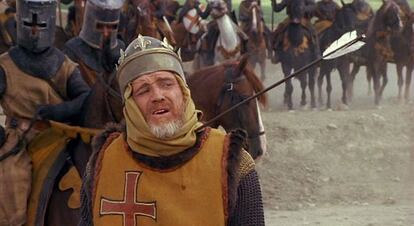
Q. How did hygiene, or the lack thereof, affect medieval sexuality?
A. That’s one of my favorite subjects. People were cleaner than we think, but they had their problems, because of the lack of adequate sanitary infrastructures. It is true that some emphasized dirt as a type of mortification, especially religious people, although extreme cases — such as the monk who boasted of having taken only three baths in his life — are probably exaggerations. The truth is that, if one was dirtier in general than today, everyone else was too, so you didn’t worry too much. We even know of testimony that a woman with sweaty armpits was considered very attractive; of course, I don’t think so.
Q. I have a friend who thinks that the worst thing about the Middle Ages was not torture, plague or the Hundred Years’ War, but rather the idea of women dragging around the filth from the streets on the bottom of their dresses.
A. There’s no reason to think that everything was so dirty; there were very strict regulations — more than we think — that suggest the fact that there was no dirt in the streets. Undoubtedly, they were dirtier than we would like, but we should not have a sense of false superiority in that regard. There were also food hygiene standards.
Q. Was female homosexuality persecuted less than male homosexuality?
A. They were both sins; it was considered sodomy, and there are cases of women being executed, but they are a very small minority compared to men. In Great Britain, it seems that they turned a blind eye [to it]. We have few testimonies; female homosexuality often went under the radar. The notion of medieval sexuality was defined by active and passive [roles], and I find that they often did not understand what two women could do together sexually: in trials, they are asked about it with considerable interest. Often what determined a punishment was that one of them acted like a man by using a dildo.
Q. What was the relationship between childhood and sex?
A. Contrary to what some people think, the concept of childhood was well defined in the Middle Ages. They had a clear age of consent: it was established by canon law, which required a girl to be at least 12 years old to marry, and a boy to be 14 [in fact, the average age of marriage was surprisingly high: over 20]. Child abuse was taken very seriously and severely punished. Like today, there were those who escaped; we know of a case in which a man accused of raping a seven-year-old girl was acquitted because he penetrated her but did not deflower her.
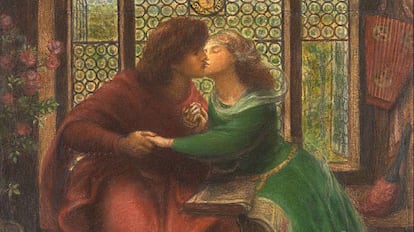
Q. What opportunities did women have to enjoy a good sex life?
A. It depended a lot on personal circumstances. But in general, you didn’t have many options. You were obliged to marry, and you were quite limited by the concept of kinship, which was much broader than ours, meaning that a lot of possible relationships were considered incestuous and forbidden. In any case, if you married a reasonable man, you could do well, but if not, you were left with very few outlets. There was almost no divorce, no notion of marital rape. On the other hand, there were more laws against sexual assault and rape than we usually think, and cases often went to court.
Q. Was bestiality common? You mention a certain Renodet Fout-Oe (“goosefucker”), but, of course, he was French.
A. There were laws prohibiting it, you could be castrated or executed, even atrociously torn limb from limb on the [execution] wheel, if you were found guilty; it was an aberration not to respect the limits God had drawn between humans and animals. Of course, there were cases [of bestiality], and both parties — man and animal — were punished.
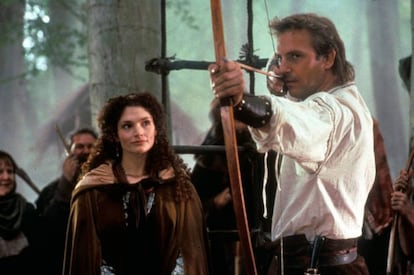
Q. Your book has destroyed a lot of our images of the Middle Ages by pointing out that there weren’t any chastity belts, there was no droit du seigneur.
A. I hope I demystified those things. They did not exist; there is no evidence [of them]. They are later inventions and correspond to the stereotype of a prudish Middle Ages, [people who were] simultaneously repressed and obsessed with sex. The way modern popular culture imagines medieval sexuality is quite inaccurate.
Q. Which films do you think have depicted medieval sexuality well?
A. I haven’t seen many. Certainly not Braveheart, which portrays a lord’s right to take a bride’s virginity on her wedding night, nor Game of Thrones, which revels in sexual violence, rape and incest in a way that is far from medieval reality. Undoubtedly, The Last Duel is much better.
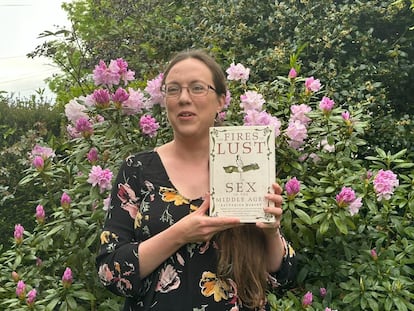
Q. So should we be happy that we haven’t had medieval sex, or did we miss out?
A. I love the Middle Ages, but I prefer not to live in them. There were very difficult situations that were hard to take. Many aspects of rights — women’s rights, gay rights — that we take for granted today simply didn’t exist then. Although I reclaim the Middle Ages and have tried to demystify them, we are certainly much better off today.
Sign up for our weekly newsletter to get more English-language news coverage from EL PAÍS USA Edition
Tu suscripción se está usando en otro dispositivo
¿Quieres añadir otro usuario a tu suscripción?
Si continúas leyendo en este dispositivo, no se podrá leer en el otro.
FlechaTu suscripción se está usando en otro dispositivo y solo puedes acceder a EL PAÍS desde un dispositivo a la vez.
Si quieres compartir tu cuenta, cambia tu suscripción a la modalidad Premium, así podrás añadir otro usuario. Cada uno accederá con su propia cuenta de email, lo que os permitirá personalizar vuestra experiencia en EL PAÍS.
¿Tienes una suscripción de empresa? Accede aquí para contratar más cuentas.
En el caso de no saber quién está usando tu cuenta, te recomendamos cambiar tu contraseña aquí.
Si decides continuar compartiendo tu cuenta, este mensaje se mostrará en tu dispositivo y en el de la otra persona que está usando tu cuenta de forma indefinida, afectando a tu experiencia de lectura. Puedes consultar aquí los términos y condiciones de la suscripción digital.








































